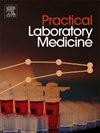无刮擦多靶点粪便RNA检测用于结直肠癌筛查的分析验证
IF 1.3
Q3 MEDICAL LABORATORY TECHNOLOGY
引用次数: 0
摘要
传统的基于粪便的结直肠癌(CRC)筛查测试要求患者收集并擦拭自己的粪便,这可能会由于厌恶而降低依从性,并引入用户错误的可变性。一种新型的多靶点粪便RNA测试(mt-sRNA, ColoSense)消除了刮拭粪便的需要。相反,患者只需将样本存放并运送到实验室。一旦收到样本,实验室技术人员将使用粪便免疫化学测试(FIT)擦拭样本并定量血红蛋白浓度。本研究评估了这种实验室粪便取样方法的可靠性和可重复性。方法通过生成已知血红蛋白浓度的粪便池,并在实验室FIT测试前将粪便池暴露于各种条件下进行分析验证。分析验证评估了冻融稳定性、干扰物质、粪便输入量、精度和运输稳定性。临床等效性也进行了评估。结果所有研究均符合预先设定的接受标准。该试验显示了长达三个冻融循环的稳定性。9种膳食物质的干扰试验对分析性能无影响。实验室FIT在五种不同的粪便输入体积中保持精度,并显示出很高的精度。在运输过程中的稳定性被证实长达120小时,支持样品在运输和处理过程中的稳健性。临床等效性表明,实验室FIT对结直肠癌的敏感性为78%,对晚期腺瘤的敏感性为33%,与先前报道的家用FIT方法的性能一致。结论实验室FIT的分析验证证明了该方法的可靠性和稳健性。这一改进可以提高基于粪便的CRC筛查的依从性和患者易用性。本文章由计算机程序翻译,如有差异,请以英文原文为准。
Analytical validation of a scrape-free multitarget stool RNA test for colorectal cancer screening
Background & aims
Traditional stool-based colorectal cancer (CRC) screening tests require patients to collect and swab their own stool, which can reduce adherence due to aversion and introduce variability from user error. A novel multitarget stool RNA test (mt-sRNA, ColoSense) eliminates the need for scraping or swabbing stool. Instead, patients merely deposit and ship a sample to the lab. Once recieved, laboratory technologists swab the sample and quantify hemoglobin concentrations using the fecal immunochemical test (FIT). This study evaluates the reliability and reproducibility of this in-laboratory fecal sampling method.
Methods
Analytical validation was performed by generating stool pools with known hemoglobin concentrations and exposing pools to various conditions prior to testing with the in-lab FIT. Analytical validation assessed freeze thaw stability, interfering substances, stool input volume, precision, and in-transit stability. Clinical equivalency was also evaluated.
Results
All studies met predefined acceptance criteria. The assay demonstrated stability for up to three freeze-thaw cycles. Interference testing with nine dietary substances showed no impact on assay performance. The in-lab FIT maintained accuracy across five different stool input volumes and demonstrated high precision. In-transit stability was confirmed for up to 120 hours, supporting sample robustness during shipping and handling. Clinical equivalency demonstrated in-lab FIT sensitivity of 78 % for CRC and 33 % for advanced adenomas, aligning with previously reported performance of the at-home FIT method.
Conclusions
Analytical validation of the in-lab FIT demonstrates the reliability and robustness of this streamlined, single-sample collection method. This improvement could enhance adherence and patient ease-of-use in stool-based CRC screening.
求助全文
通过发布文献求助,成功后即可免费获取论文全文。
去求助
来源期刊

Practical Laboratory Medicine
Health Professions-Radiological and Ultrasound Technology
CiteScore
3.50
自引率
0.00%
发文量
40
审稿时长
7 weeks
期刊介绍:
Practical Laboratory Medicine is a high-quality, peer-reviewed, international open-access journal publishing original research, new methods and critical evaluations, case reports and short papers in the fields of clinical chemistry and laboratory medicine. The objective of the journal is to provide practical information of immediate relevance to workers in clinical laboratories. The primary scope of the journal covers clinical chemistry, hematology, molecular biology and genetics relevant to laboratory medicine, microbiology, immunology, therapeutic drug monitoring and toxicology, laboratory management and informatics. We welcome papers which describe critical evaluations of biomarkers and their role in the diagnosis and treatment of clinically significant disease, validation of commercial and in-house IVD methods, method comparisons, interference reports, the development of new reagents and reference materials, reference range studies and regulatory compliance reports. Manuscripts describing the development of new methods applicable to laboratory medicine (including point-of-care testing) are particularly encouraged, even if preliminary or small scale.
 求助内容:
求助内容: 应助结果提醒方式:
应助结果提醒方式:


